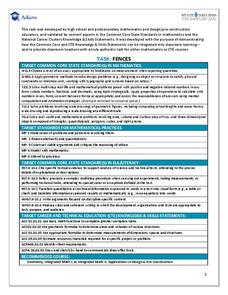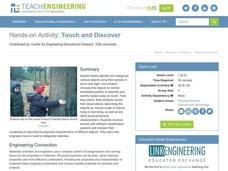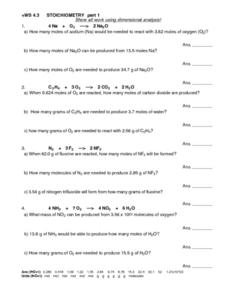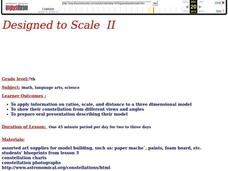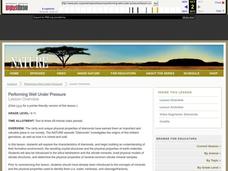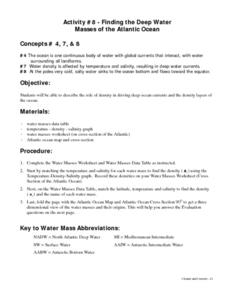Teach Engineering
Connect the Dots: Isometric Drawing and Coded Plans
Individuals discover how to draw cubes on triangle-dot paper. They use cubes to build structures and draw corresponding isometric drawings on dot paper in the second lesson of the series of five. The activity also introduces the concept...
Achieve
Fences
Pupils design a fence for a backyard pool. Scholars develop a fence design based on given constraints, determine the amount of material they need, and calculate the cost of the project.
Curated OER
Lesson 4 Activity 1: Mapping the Third Dimension
Students work in pairs to construct a simple stereoscope.
Curated OER
Mapping Seamounts in the Gulf of Alaska
Students describe major topographic features on the Patton Seamount, and interpret two-dimensional topographic data. They create three-dimensional models of landforms from two-dimensional topographic data.
Curated OER
The Earth is an Orange
Students examine and identify the various types of maps. Using two types of maps, they compare the data that can be gathered from each one. They also identify and locate the continents and the oceans. They review the purposes of each...
Curated OER
Mountains in the Sea Exploration No Escape
Students study data to hypothesis about the influence of a water circulation cell on the retention of benthic invertebrate larvae in the area of a seamount. They investigate the positives and negatives of larvae retention in this series...
Curated OER
Touch and Discover
Students work together to identify and categorize objects. They have to identify the object on touch because they are blindfolded. They record their data and describe the objects once they can look at them.
Curated OER
Oh! The Places I CAN See!
Students explore landmarks around the world. In this world geography and technology lesson, students view world landmarks using a webcam. Students take a virtual field trip during which they zoom in and manipulate three dimensional...
Curated OER
To Float or Not to Float, That is the Question?
Ninth graders develop operational definition of density, do computations using density equation, categorize pieces of matter as being able to float on
water or not, based on density, explain why some objects sink or float based on...
Curated OER
Electron Configuration Worksheet
In this chemistry worksheet, students complete the table for each element by writing the electron configuration of the element and giving the values of the four quantum numbers. They also create an energy level diagram for their element...
Curated OER
WS 4.2 The Mole
In this moles worksheet, students convert measurements of moles to mass, measurements of mass to moles, measurements of moles to atoms or molecules and measurements of atoms or molecules to moles.
Curated OER
WS 4.4 Stoichiometry
In this stoichiometry worksheet, students are given four chemical reactions and they find quantities of products made, limiting reactants, excess reactants, and percent yield of products.
Curated OER
WS 4.3 Stoichiometry Part I
In this stoichiometry worksheet, students use four balanced equations to calculate mole of products made, moles of reactants needed for chemical reactions to proceed and mass of reactants needed to produce products.
Curated OER
Designed to Scale
Seventh graders study ratios, scale and distances according to a three dimensional model. In this exploratory lesson students create their own constellation and prepare an oral presentation that describes their model.
Teach Engineering
Organic Solar Energy and Berries
You can eat a solar cell? A unit on solar energy begins with a discussion about organic solar cells, followed by directions on how to build your own. After following the teacher's directions to build an anthocyanin...
Alabama Learning Exchange
Energy and Work Amusement Park Style
Students distinguish between kinetic and potential energy. They recognize that energy can change from one form to other forms. They identify and describe several forms of energy.
Curated OER
Classification
Students explore the observable properties of matter and utilize them in classification. They use a binary classification system to divide objects, then justify their scheme.
Curated OER
Performing Well Under Pressure
Students study the physical properties of minerals and illustrate their functions. In this mineral lesson students construct models of some minerals.
Curated OER
Kure Waste Chase Game Lesson
Students work together to identify marine debris. They explain the effect of the debris on various ecosystems. They draw different types of ocean currents as well.
Curated OER
Finding the Deep Water Masses of the Atlantic Ocean
Students describe the role of density in driving deep ocean currents and the density layers of the ocean. They determine that the ocean is one continuous body of water with global currents that interact, with water surrounding all...
Curated OER
The Ties that Bind
In this bonding worksheet, students read about the types of bonds that hold compounds together. They are given fifteen common materials and they identify the types of bonds that hold each together.
Curated OER
No Escape
Via four student handouts, marine biology learners examine the topography and circulation cell of the Fieberilng guyot. Then they examine the number of individual hydroids counted at each depth. Pupils use the information to relate water...
Curated OER
Burn, Baby Burn (Or Not)
Physics learners apply the concepts of fluid pressure input and output to firefighting. Divide your class into small groups and give them each a few cards that list nozzle type, hose length, hose size, and structure dimensions, They are...
Curated OER
Comparing Measurements
Students explore measurements by completing worksheets in class. In this geometry lesson, students identify the basic measurement units in both the English and metric systems. Students analyze 2 and 3 dimensional objects and identify...



